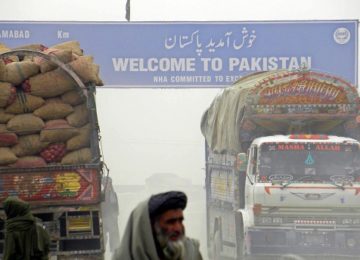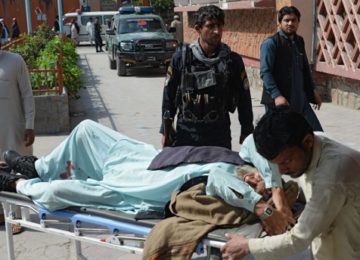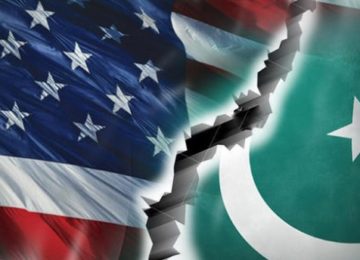In what appears to be a realization on the part of the US regarding Pakistan’s vital role in Afghan peace process, the US Secretary of State Mike Pompeo telephoned Pakistan’s Army Chief Gen. Qamar Javed Bajwa on Thursday to discuss the “need for political reconciliation in Afghanistan”. Pompeo also discussed “the importance of targeting all militant and terrorist groups in South Asia without distinction” and “ways to advance US-Pakistan bilateral relations”. Within 24 hours, this followed Vice President Mike Pence calling Pakistan’s newly appointed caretaker Prime Minister Nasir ul Mulk conveying his felicitations to the premier on assuming office. The two calls urgently held the need for Pakistan’s cooperation for peace in Afghanistan and came after a lapse of any high-level engagement since Donald Trump’s announcement of the US strategy for South Asia and Afghanistan, last August.
The relations between the two countries had particularly remained strained since President Trump’s South Asian plan, which categorically remained critical of Pakistan’s role in Afghanistan and the region in general. Trump also followed with suspension of civilian and military assistance to Islamabad coupled with the US President’s tweet accusing Pakistan of “lies and deceit” at the start of the new year. The two countries also imposed tit-for-tat travel restrictions on each other’s diplomats and held no high-level political contact until Thursday when Pompeo called Bajwa. However, this never prevented the Pentagon from maintaining its contact with its counterparts in Pakistan’s military establishment.
While the US has always preferred using the Pentagon channel to communicate with Pakistan’s military, Pompeo’s unusual call to Pakistani’s army chief seems to be coming from a sense of urgency. This sense of urgency depicts the understanding of the Trump administration that Rawalpindi’s key role in restoring peace in Afghanistan cannot be undermined. Earlier this month, Secretary Pompeo had told a congressional hearing in Washington that the US was now encouraging direct talks between Taliban and Afghan government officials as the first step towards ending the conflict. At the same time, in response to President Ghani’s announcement of the temporary week-long ceasefire with the Taliban, Pompeo announced that the American and NATO troops in Afghanistan will also observe a temporary ceasefire in support of the Afghan government’s initiative.
The following day, the Taliban, too, announced a three-day ceasefire on Eid, at the end of the Muslim holy month of Ramadan, which is the first time the group has agreed to a ceasefire at Eid since US invasion in 2001. However, the ceasefire by the Afghan Government and the US and NATO troops excludes the continued operations against the ISIS and other militant groups in Afghanistan, as well as any attacks in self-defense. “All the mujahideen are directed to stop offensive operations against Afghan forces for the first three days of Eid-al-Fitr,” the Taliban said in a WhatsApp message. “But if the mujahideen are attacked we will strongly defend [ourselves].”
Pompeo’s statements had earlier created an impression in Washington that the Trump administration was now exploring the possibility of by-passing Pakistan by promoting direct negotiations between the Afghan government and the Taliban. However, the US department of State’s call to Pakistan’s military before Ghani’s ceasefire announcement gives the impression that the US is now attempting to ease public pressure on Pakistan. It is doing so by not using its standard accusations against Pakistan with regards to Pakistan-based militant groups and by replacing it with a more general reference to South Asia.
Just two days before Pompeo’s call to Bajwa, Pakistan Army spokesperson Major General Asif Ghafoor had noted that Pakistan will try to use “whatever leverage” it had over the Taliban – though affirming that it was receding over time – to find an amicable solution in Afghanistan. However, he categorically added that the Afghan Government has an important lead role in any such effort along with the US, which was a stakeholder by all means. The general had also added that Pakistan does not want the US to leave behind a chaotic Afghanistan like they had done before.
With the dynamics unfolding in the Pak-US-Afghan trio, it seems that the US once again is left with no option but to acknowledge Pakistan’s key role in the Afghan peace process. This acknowledgement comes after US had previously taken drastic actions against its front-line war on terror ally and had cast doubts on its seriousness in countering extremism in its territory and the region. However, the recent contact by the US with Pakistan is also being seen as a possible honey-trap by the superpower for objectives which may unfold shortly. The US continues to grapple with its embarrassing failures in the seventeen year-long Afghan War, remaining always in search for a face-saving exit.
The recent resumption of Pak-US high-level contact, after a lapse, should be seen as a positive sign for the peace process in Afghanistan, which highlights the need for diplomacy and negotiations over guns or threats.
The author Sitwat Waqar Bokhari is a Research Fellow/Programme Consultant at the Center for Research and Security Studies (CRSS). She holds an MPhil degree in International Relations from National Defence University. She tweets @SitwatWB.
© Center for Research and Security Studies (CRSS) and Afghan Studies Center (ASC), Islamabad.








